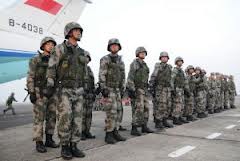
New Delhi, July 25: India has to be prepared militarily to deal with an "assertive" China even as it seeks to build bridges of cooperation with Beijing, the Naresh Chandra Task Force on national security has recommended.
The committee's suggestions for the military — details of which have been accessed by TOI — also buries the proposal for a Chief of Defence Staff (CDS), the single point military adviser to the government. Instead, it has recommended that a permanent Chairman Chiefs Of Staff Committee be appointed from among the three service chiefs, allowing India to have four four-star generals.
The panel has given a set of recommendations for reforming the national security architecture, covering both intelligence and military apparatus, as part of its mandate to review it.
It has recommended a re-look at the process of blacklisting truant defence firms, separating the post of DRDO chief and scientific advisor to the defence minister, appointing military officers upto the rank of joint secretary in the ministry of defence (MoD), creating new Special Forces Command etc.
The recommendations of the panel are being studied by individual services and agencies that would be affected by the changes. Their responses are expected to be with the government over the next few weeks.
While conceding that there has been improvement in Sino-Indian relations in recent years, the report has conceded that it is "still clouded in mistrust". The committee, headed by the former cabinet secretary, says, "There is concern about China's policy of "containment" of India, marked by growing Chinese interest in countries of South Asia. China will continue to utilize Pakistan as part of its grand strategy for containing India in a "South Asian box"."
"China's growing assertiveness on the border and in its territorial claims on Arunachal Pradesh has intensified misgivings," the committee says. "The crucial concern is whether China will become militarily more assertive and nationalistic as its economic and military power grows, or whether it will abide by the policies advocated by Deng Xiao Ping," the report says.
More importantly, across Asia there is concern that as Beijing grows "the United states will become more circumspect and accommodating in dealing with China," the panel says.
The committee has recommended that the government take an immediate decision on the existing recommendation that the Army be given management of Sino-Indian borders, and retain operational control over forces deployed in the areas.
On Pakistan, the committee suggests that it "remains both unable and unwilling to set its house in order, or put in place economic policies that can increase or sustain growth". And there is "nothing to suggest that the Pakistani military has given up the use of radical Islamic groups to promote terrorism in both India and Afghanistan." But its biggest concern is Pakistan's ambition to use Afghanistan for strategic depth. The panel has recommended that India "should spare no effort, politically, diplomatically, economically and through military assistance to ensure that Pakistani efforts to convert Afghanistan into an extremist run, pliant and client state are frustrated".
Calling for better coordination between the ministries of defence and foreign affairs, the panel recommends that the MoD set up a bureau of politico-military affairs. "The primary role of this Bureau would be liaison with the ministry of external affairs (MEA) on issues and actions having foreign policy applications," the committee says.
It has recommended that MEA affairs also consider accepting officials from civil services and armed forces on short duration (five years) deputations.




Comments
Add new comment